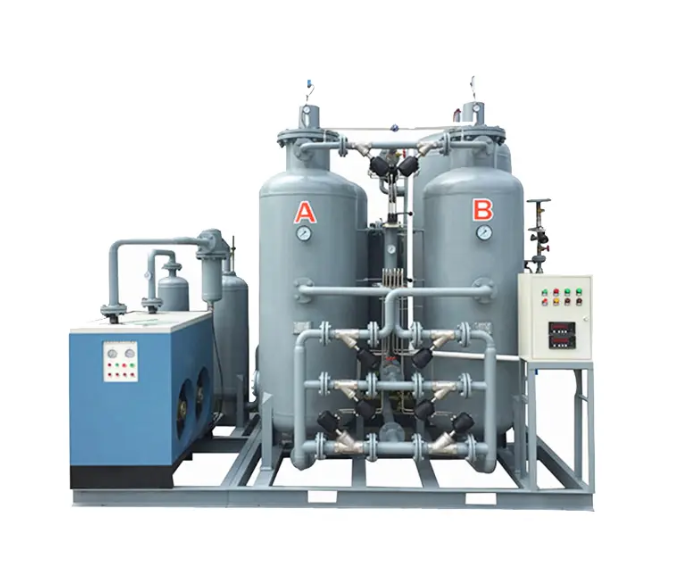I believe a PSA Nitrogen Plant plays a vital role in modern industries. It generates high-purity nitrogen gas on-site, eliminating the need for external suppliers. This system reduces operational costs while ensuring a consistent nitrogen supply. Its eco-friendly design aligns with sustainability goals, making it an essential tool for industries striving for efficiency and environmental responsibility.
Key Takeaways
- PSA Nitrogen Plants make pure nitrogen at the site. This lowers costs and removes the need for outside suppliers.
- These plants help many industries like food, medicine, and electronics. They keep products safe and of good quality.
- PSA Nitrogen Plants are eco-friendly and use less energy. They also cut down on pollution, supporting green goals.
How PSA Nitrogen Plants Work and Their Benefits
How PSA Technology Generates Nitrogen
I find the Pressure Swing Adsorption (PSA) process fascinating. It uses advanced technology to separate nitrogen from compressed air. The system relies on specialized adsorbent materials, such as carbon molecular sieves, which selectively trap oxygen and other impurities. Compressed air enters the PSA nitrogen plant, where it passes through these adsorbents. The adsorbents capture oxygen molecules, allowing nitrogen to flow through as the primary output.
The process operates in cycles. While one adsorption tower generates nitrogen, another regenerates by releasing the trapped oxygen. This alternating cycle ensures a continuous supply of high-purity nitrogen. The PSA technology is efficient and eliminates the need for complex cryogenic systems. It provides a reliable solution for industries requiring consistent nitrogen production.
Benefits of PSA Nitrogen Plants
The advantages of using a PSA nitrogen plant are numerous. First, it offers cost savings by eliminating the need for external nitrogen suppliers. On-site production reduces transportation and storage expenses. Second, the system delivers high-purity nitrogen, meeting the stringent requirements of industries like pharmaceuticals and electronics.
I also appreciate its eco-friendly design. The PSA process minimizes energy consumption and reduces carbon emissions. Additionally, the compact design of these plants makes them easy to install and maintain. Their scalability allows industries to adjust production based on demand, ensuring operational flexibility.
In my experience, PSA nitrogen plants enhance efficiency and sustainability, making them an indispensable asset for modern industries.
Applications of PSA Nitrogen Plants in Industries
Food & Beverage Industry
I have seen how the food and beverage industry relies on nitrogen to preserve product quality. A PSA Nitrogen Plant ensures a steady supply of high-purity nitrogen for packaging, preventing oxidation and spoilage. Nitrogen also extends shelf life by creating an inert atmosphere inside food containers. In beverage production, it helps maintain carbonation levels and prevents contamination during bottling.
Pharmaceutical Industry
The pharmaceutical sector demands stringent quality standards. A PSA Nitrogen Plant provides the high-purity nitrogen required for drug manufacturing and packaging. Nitrogen protects sensitive compounds from degradation caused by oxygen exposure. It also ensures sterile environments during production, safeguarding product integrity.
Electronics Industry
Electronics manufacturing requires precision and contamination-free environments. I have observed how PSA Nitrogen Plants deliver nitrogen for soldering, circuit board assembly, and semiconductor production. Nitrogen prevents oxidation during these processes, ensuring product reliability and performance.
Oil & Gas Industry
In the oil and gas sector, nitrogen plays a critical role in enhancing safety and efficiency. PSA Nitrogen Plants supply nitrogen for purging pipelines, blanketing storage tanks, and maintaining pressure in drilling operations. This reduces the risk of explosions and ensures smooth operations.
Metal Manufacturing Industry
Metal manufacturers use nitrogen to prevent oxidation during heat treatment and welding. A PSA Nitrogen Plant provides a cost-effective solution for creating an inert atmosphere, improving product quality and reducing waste.
Aerospace Industry
The aerospace industry depends on nitrogen for testing and manufacturing components. PSA Nitrogen Plants supply nitrogen for leak testing, fuel tank inerting, and maintaining controlled environments. This ensures the safety and reliability of aerospace systems.
Mining Industry
In mining, nitrogen enhances safety by displacing oxygen in hazardous environments. PSA Nitrogen Plants provide on-site nitrogen for inerting, preventing fires, and supporting equipment operations in underground mines.
Plastics and Injection Molding Industry
Nitrogen improves the quality of plastic products by reducing defects during injection molding. A PSA Nitrogen Plant supplies nitrogen for gas-assisted molding, ensuring smooth surfaces and precise dimensions in finished products.
I believe a PSA Nitrogen Plant is a game-changer for industries needing high-purity nitrogen gas. It reduces costs, enhances sustainability, and boosts operational efficiency. Its adaptability supports diverse applications, from food preservation to aerospace. Adopting this technology optimizes processes and minimizes reliance on external suppliers, ensuring long-term industrial success.
FAQ
What industries benefit the most from PSA nitrogen plants?
I have observed that industries like food & beverage, pharmaceuticals, electronics, and aerospace benefit significantly. These plants ensure high-purity nitrogen for critical applications.
How does a PSA nitrogen plant improve operational efficiency?
On-site nitrogen production eliminates supply chain delays. It reduces costs associated with transportation and storage, ensuring a consistent and reliable nitrogen supply.
Are PSA nitrogen plants environmentally friendly?
Yes, I find them eco-friendly. Their energy-efficient design minimizes carbon emissions, aligning with sustainability goals while maintaining high performance in industrial operations.
Post time: Feb-04-2025

